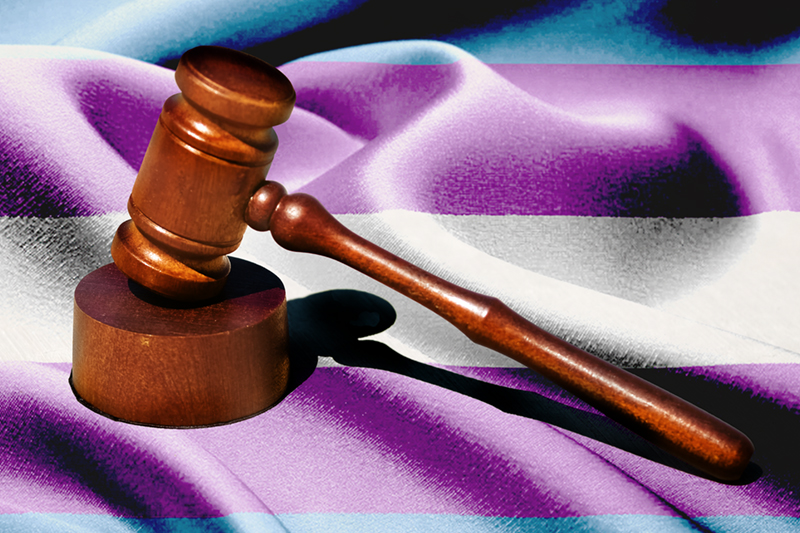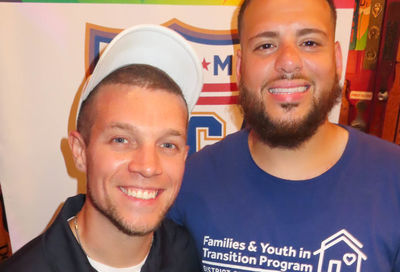Unhappy Birthday: One year after North Carolina’s HB2
As HB2 hits its first year, transgender North Carolinians remain casualties of a right-wing agenda

“In the past year, HB 2 has made me aware that I’m now literally an outlaw,” says Liam Hooper, a 53-year-old transgender minister with the United Church of Christ from Winston-Salem, N.C. “My birth certificate still has my birth name and birth gender on it. So when I go into a public building and use the restroom, I’m intentionally breaking the law.”
For Hooper, who was born in Indiana, obtaining an amended birth certificate would be immensely difficult. Hooper would have to return to his birth state, obtain legal representation (at personal cost), petition a judge to allow him to change his name and gender, and hope that the judge grants a court order to compel the state to amend his birth certificate.
Birth certificates can be problematic for transgender people in even the most LGBTQ-friendly states. But it’s much worse for Hooper following the passage of HB 2, North Carolina’s so-called “bathroom bill,” which prohibits transgender people from using restrooms or other facilities that do not match the gender listed on their birth certificate.
While HB 2’s passage has not led to mass arrests, many transgender residents fear what could happen if they were outed while using a restroom, or if law enforcement attempted to stringently enforce the law. And the bigotry is spreading outside of North Carolina — lawmakers in Alabama have proposed a bill that would take the idea behind HB 2 even further, requiring multi-user restrooms for either gender to be staffed by a restroom attendant who will “monitor the appropriate use of the restroom.”
As a result, Hooper won’t use facilities in certain areas of the state. It requires him to be mindful of what he eats and drinks before going out in public, even though he can “pass” as male and has not previously had an issue using men’s restrooms.
“There are just some places I’m not going to put my trans body right now, at least not alone. There are some places in North Carolina, where, even with some degree of white male ‘passing,’ I’m not going to be safe in those men’s rooms,” he says.
“I’m very aware of how I hydrate when I’m going to be away from home for a while or when I’m in spaces that are considered public,” he adds. “I might not eat when I’m out, or drink very much when I’m out, so I can navigate with a little more assurance where I would have to go to relieve myself.”
Hooper is not alone in altering his behavior following HB 2’s passage. As the facilitator of a trans support group in Winston-Salem, he hears from high schoolers and college students who intentionally avoid food or drink so they don’t have to be forced to use facilities that don’t match their gender identity.
Hooper, who was at the State Capitol in Raleigh on the day lawmakers passed HB 2, believes lawmakers succeeded in achieving their goal, which was to create an atmosphere of fear and confusion, based on misconceptions about transgender people, in order to further a right-wing agenda.
“I think they knew exactly what they were doing, which was try to create an environment of vigilantism, where people are policing public spaces,” he says. “And it’s based on a misconception that trans people are just folks in various stages of drag. They don’t understand fundamentally, that [trans] women go in the women’s spaces and [trans] men go into men’s spaces.”
From 34-year-old Alex McNeill’s perspective, the biggest impact of HB 2 is that it has given voice to people who always held anti-transgender animus in their hearts, but might have been reticent to express that previously. Now, it’s emboldened those people to attempt to “out” those they believe to be transgender, he says.
“The bathroom policing has always existed, but HB 2 has just given people a legal avenue for feeling like they’re on the right side,” says McNeill, who moved back to the Asheville area from Washington, D.C., just two weeks before HB 2 was passed.
“It makes me feel really sad to hear the ways transgender people are talked about, and used to pass these restrictive laws,” he adds. “The thing I keep telling folks, especially when talking about safety, is that, as a group of people who are always concerned about safety for themselves, we’re always looking to make sure others feel safe, because we’re often the ones targeted for abuse and violence.”
Alaina Brennan-Kupec, 47, of Chapel Hill, N.C., initially thought that former Gov. Pat McCrory would take the time to learn about the transgender community and might even consider vetoing the bill. Her reasoning was sound — Republican South Dakota Gov. Dennis Daugaard nixed a similar measure in his state. But McCrory signed HB 2 into effect within hours of its passage, further underscoring the rapidity with which Republicans jammed through the controversial law.
“I don’t think that this was ever a law about protecting women and children in the state,” she says. “I think this is a law that’s been put forward solely for the political gain of the party in power. They thought this would be a slam dunk that would appease their base in an election year, and they didn’t want anything to derail that.”
She also notes that HB 2 has provisions that cover more than just restrictions on public restrooms. It essentially nullified local municipalities’ nondiscrimination ordinances if they extended protections to the LGBTQ community. It also prevented people from suing in instances where they felt they had been discriminated against, and, in a giveaway to the Chamber of Commerce, capped the minimum wage in the state.
A marketing director for a pharmaceutical company, Brennan-Kupec has never had any negative encounters when trying to use the restroom since HB 2’s passage. But she still has some concerns when using public facilities, even if most people can’t guess she’s transgender.
“I don’t feel uncomfortable, but I’m conscious of it. That was something that was not the case before HB 2,” she says. “I never thought twice about my safety in a restroom. Now, when I use a restroom in the airport, or out in public, I’m always conscious of ‘Do I have to be worried? Do I have to be concerned that someone might know that I’m transgender?’ It’s a constant state of fear of what could happen whenever I go to the bathroom.”
Having just celebrated its one year anniversary, HB 2 remains one of the most controversial anti-LGBTQ measures ever passed, not only in North Carolina’s history, but nationwide. To this day, it holds the dubious distinction of being the only bill restricting transgender restroom use to be signed into law.
Following its passage, North Carolina was beset by a barrage of negative press and high-profile cancellations of concerts, conventions, and sporting events. According to an analysis by the Associated Press, the state lost $196 million, something that’s been noticed by Alex McNeill, who lives in tourism-dependent Asheville.
“I know of friends who run small businesses dependent on the tourism industry, who have had business slow down and lost money, because over the summer and fall, the crowds have been diminished,” he says.
The state’s business community urged for the law’s repeal, warning that it would halt investment in the state when LGBTQ-friendly companies scuttled plans for expansion or refused to set up shop there. But the Republican-dominated General Assembly stubbornly stood its ground, resulting in financial losses that can never be recouped.
North Carolina stands to lose additional revenue if HB 2 isn’t repealed, due to the NCAA, which will consider the presence of pro-LGBTQ laws or anti-LGBTQ laws when selecting a host city for sporting championships. North Carolina could potentially be denied a chance to host any NCAA championships through 2022. Hooper hopes the NCAA stands strong in its threat to bypass the state.
“As much as I am not necessarily a proponent of focusing all of our responsive rhetoric and messaging around money, I realize that is also the way you get certain people’s attention,” he says. “What we’ve seen with the majority of politicians in North Carolina is that they don’t care. They fundamentally do not want for people to have the freedom to be who they are, and live out their gender in a way that feels consistent with their self-understanding. There really is an agenda against trans people, to the point that they’re willing to suffer loss of revenue.”
Unfortunately, the state’s polarized politics and the intransigence of the General Assembly have left North Carolina at a standstill. Despite attempts by Democrats, particularly recently elected Gov. Roy Cooper, to negotiate a deal to repeal HB 2, Republicans have refused to pass anything that doesn’t keep in place the anti-transgender restrictions.
“I think the only way there’s going to be movement on HB 2 is through the court system,” says Brennan-Kupec, noting that there are two separate pending lawsuits challenging the law. “Ultimately, the legislature’s had multiple opportunities to repeal this legislation. They might trim around the edges, but what they do will never be acceptable. It will always be window dressing. So I think we’re going to have the status quo for the foreseeable future.”
However, the one positive thing about HB 2 is that it has brought together and energized those North Carolinians who oppose the law’s anti-LGBTQ measures. More than ever, they’re fighting for values that are important to them, including tolerance, a respect for diversity, and inclusion.
“I think what happened in North Carolina is a prelude to what’s going to happen nationally,” Brennan-Kupec says. “And I think we’re going to continue to see that play out in the next year or two across the country.”
Support Metro Weekly’s Journalism
These are challenging times for news organizations. And yet it’s crucial we stay active and provide vital resources and information to both our local readers and the world. So won’t you please take a moment and consider supporting Metro Weekly with a membership? For as little as $5 a month, you can help ensure Metro Weekly magazine and MetroWeekly.com remain free, viable resources as we provide the best, most diverse, culturally-resonant LGBTQ coverage in both the D.C. region and around the world. Memberships come with exclusive perks and discounts, your own personal digital delivery of each week’s magazine (and an archive), access to our Member's Lounge when it launches this fall, and exclusive members-only items like Metro Weekly Membership Mugs and Tote Bags! Check out all our membership levels here and please join us today!

























You must be logged in to post a comment.